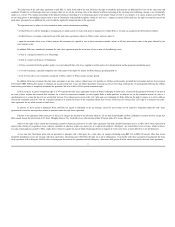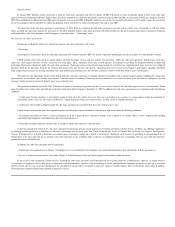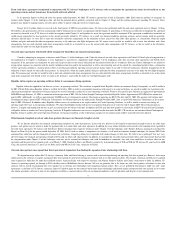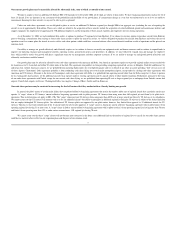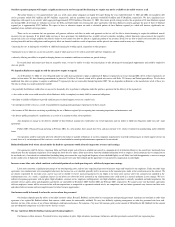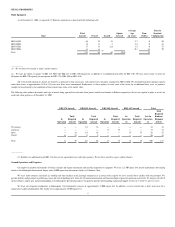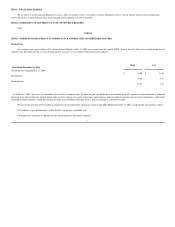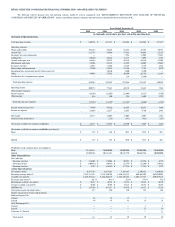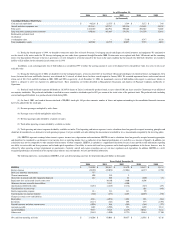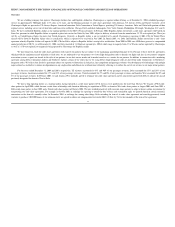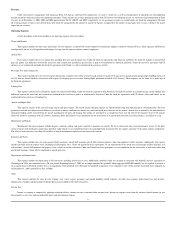Frontier Airlines 2004 Annual Report Download - page 26
Download and view the complete annual report
Please find page 26 of the 2004 Frontier Airlines annual report below. You can navigate through the pages in the report by either clicking on the pages listed below, or by using the keyword search tool below to find specific information within the annual report.
The airline industry is heavily regulated.
Airlines are subject to extensive regulatory and legal compliance requirements, both domestically and internationally, that involve significant costs. In the last several years, the FAA has
issued a number of directives and other regulations relating to the maintenance and operation of aircraft that have required us to make significant expenditures. FAA requirements cover, among
other things, retirement of older aircraft, security measures, collision avoidance systems, airborne windshear avoidance systems, noise abatement, commuter aircraft safety and increased
inspection and maintenance procedures to be conducted on older aircraft.
We incur substantial costs in maintaining our current certifications and otherwise complying with the laws, rules and regulations to which we are subject. We cannot predict whether we
will be able to comply with all present and future laws, rules, regulations and certification requirements or that the cost of continued compliance will not significantly increase our costs of doing
business.
The FAA has the authority to issue mandatory orders relating to, among other things, the grounding of aircraft, inspection of aircraft, installation of new safety
-
related items and removal
and replacement of aircraft parts that have failed or may fail in the future. A decision by the FAA to ground, or require time consuming inspections of or maintenance on, all or any of our Embraer
regional jets, for any reason, could negatively impact our results of operations.
In addition to state and federal regulation, airports and municipalities enact rules and regulations that affect our operations. From time to time, various airports throughout the country have
considered limiting the use of smaller aircraft, such as Embraer regional jets, at such airports. The imposition of any limits on the use of Embraer regional jets at any airport at which we operate
could interfere with our obligations under our code
-
share agreements and severely interrupt our business operations.
Additional laws, regulations, taxes and airport rates and charges have been proposed from time to time that could significantly increase the cost of airline operations or reduce revenues.
For instance, "passenger bill of rights" legislation was introduced in Congress that, if enacted, would have, among other things, required the payment of compensation to passengers as a result of
certain delays and limited the ability of carriers to prohibit or restrict usage of certain tickets in manners currently prohibited or restricted. This legislation is not currently active but if it is
reintroduced, these measures could have the effect of raising ticket prices, reducing revenue and increasing costs. Restrictions on the ownership and transfer of airline routes and takeoff and
landing slots have also been proposed. In addition, as a result of the terrorist attacks in New York and Washington, D.C. in September 2001, the FAA and the Transportation Security
Administration (TSA) have imposed stringent security requirements on airlines. We cannot predict what other new regulations may be imposed on airlines and we cannot assure you that laws or
regulations enacted in the future will not materially adversely affect our financial condition, results of operations and the price of our common stock.
Risks Related To Our Common Stock
Our stock price is volatile.
Since our common stock began trading on The Nasdaq National Market on May 27, 2004, the market price of our common stock has ranged from a low of $8.15 to a high of $15.00
per share. The market price of our common stock may continue to fluctuate substantially due to a variety of factors, many of which are beyond our control, including:
•
announcements concerning our code
-
share partners, competitors, the airline industry or the economy in general;
•
strategic actions by us, our code
-
share partners or our competitors, such as acquisitions or restructurings;
•
media reports and publications about the safety of our aircraft or the aircraft types we operate;
•
new regulatory pronouncements and changes in regulatory guidelines;
•
general and industry
-
specific economic conditions;
•
changes in financial estimates or recommendations by securities analysts;
•
sales of our common stock or other actions by investors with significant shareholdings or our code
-
share partners; and
•
general market conditions.
The stock markets in general have experienced substantial volatility that has often been unrelated to the operating performance of particular companies. These broad market fluctuations
may adversely affect the trading price of our common stock.
In the past, stockholders have sometimes instituted securities class action litigation against companies following periods of volatility in the market price of their securities. Any similar
litigation against us could result in substantial costs, divert management's attention and resources and harm our business.
Future sales of our common stock by our stockholders could depress the price of our common stock.
Sales of a large number of shares of our common stock, the availability of a large number of shares for sale, or sales of shares of our common stock by Delta could adversely affect the
market price of our common stock and could impair our ability to raise funds in additional stock offerings. We have 32,458,756 shares of common stock outstanding. Our principal stockholder,
Delta and our directors and executive officers are subject to agreements with the underwriters of our recent follow
-
on offering that restrict their ability to transfer their stock until early May 2005.
Merrill Lynch, on behalf of the underwriters, may, in its sole discretion and at any time, waive the restrictions on transfer in these agreements during this period. After these agreements expire, all
of these shares will be eligible for sale in the public market.
Our incorporation documents and Delaware law have provisions that could delay or prevent a change in control of our company, which could negatively affect your investment.
In addition to the fact that Wexford Capital owns the majority of our common stock, our certificate of incorporation and bylaws and Delaware law contain provisions that could delay or
prevent a change in control of our company that stockholders may consider favorable. Some of these provisions:
•
authorize the issuance of up to 5,000,000 shares of preferred stock that can be created and issued by our board of directors without prior stockholder approval, commonly referred to as
"blank check" preferred stock, with rights senior to those of our common stock;
•
limit the persons who can call special stockholder meetings;
•
provide that a supermajority vote of our stockholders is required to amend our certificate of incorporation or bylaws; and
•
establish advance notice requirements to nominate directors for election to our board of directors or to propose matters that can be acted on by stockholders at stockholder meetings.
These and other provisions in our incorporation documents and Delaware law could allow our board of directors to affect your rights as a stockholder by making it more difficult for


